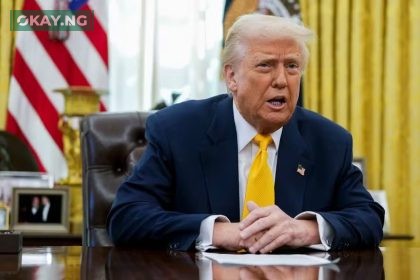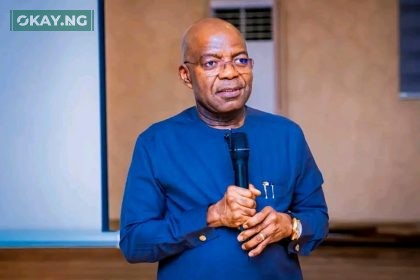“I couldn’t wrap my head around it,” says Oby Ezekwesili. “More than two hundred schoolgirls!” Eight months on, she still sounds incredulous as she recalls the moment she heard Boko Haram had kidnapped more than 200 female students in north-eastern Nigeria.
The mass abduction, during which extremists stormed the girls’ dorm at around midnight and forced the terrified teenagers on to trucks at gunpoint, propelled the remote village of Chibok into the global spotlight in April. The fact that it has stayed there is in large part due to the Bring Back Our Girls movement co-founded by Ezekwesili and three other Nigerian women. In the face of personal threats, they have remained driven by an abiding sense of outrage.
Ezekwesili, a former minister and co-founder of anti-corruption group Transparency International, doubted the news at first. She said, “I couldn’t believe it was true. I was tweeting to all the government handles, presidential aides, TV stations. Nobody replied. Everybody just went under.”
In the early aftermath, the official response – or lack of it – only compounded the horror. A presidential statement was more than two weeks in coming. The president’s wife weighed in, personally interrogating some protest leaders and dismissing the abduction as a plot to bring down her husband. The army, meanwhile, was forced to backtrack on a bewildering claim it had rescued all of the girls.
In fact, around 50 of the girls had escaped by jumping out as they were driven towards Boko Haram’s forest training camps. The others, however, remained missing.
Enraged by this apparent indifference, Ezekwesili and others organised a march to the national assembly in the capital, Abuja. Phalanxes of policemen barred the crowd of red-shirted protesters from approaching any official buildings, but the Bring Back Our Girls campaign was born. A Twitter hashtag of the same name caught the world’s attention, with Ezekwesili leading the online movement.
“Since the beginning, they have tried to make us shut up,” says Ezekwesili, who in July tweeted to say that security operatives had tried to prevent her boarding a flight to London, where she was appearing on a BBC programme.
All four of the movement’s co-founders stand out in a society with acute gender disparity.
Alongside Ezekwesili, there is Hadiza Bala Usman, an opposition party member who brought the women together and made her name working with anti-corruption campaigners; lawyer and child rights advocate Maryam Uwais, whose scathing takedown of an MP’s arguments in favour of child marriage has entered local campaigners’ folklore; and Saudatu Mahdi, who runs a women’s rights group helping to strengthen anti-violence legislation.
For her part, Ezekwesili has been sharpened for battle by two years in government, first under the department of mines, then later as education minister. Sporting a red beret over her close-cropped hair, she appears regularly at daily vigils in Abuja.
But some have accused them of using the movement as a platform for political gain . Official intimidation has never been far behind, and so toxic is partisanship in Nigeria that a significant minority still believe the abduction was an elaborate hoax to smear the government in upcoming elections that will probably be the most closely fought since a return to democracy in 1999.
Ezekwesili shrugs off such theories. “The way our government handled the Chibok girls’ case goes beyond an election matter,” she says impatiently. “This is not a one-time issue we discuss over elections. We need to have a deeper conversation about what kind of a nation we want to be.”
Less easy to dismiss are those who insist the movement has outlived its usefulness. “Today is day 241,” Ezekwesili counters, speaking slowly in an attempt to contain her obvious anger, “and the girls are still not back. If some people want to move on, it’s their right.
“But they should remember we moved on when 69 secondary school boys were killed, and nothing changed,” she continues, her voice rising despite herself. “Now here we are, with many more children killed. Do our children now have to choose between getting an education and dying? Some of us cannot move on and accept that kind of society.”
Ezekwesili says she is haunted by a father who told her some parents preferred to accept their daughters were dead than live in a tormented limbo. Previous hostages who have escaped the sect have spoken of rape and mutilation, and some are so traumatised they no longer remember their own names.
Nonetheless, the father told her: “No matter who my daughter is when she comes back, she is my daughter and I want her back home.”












